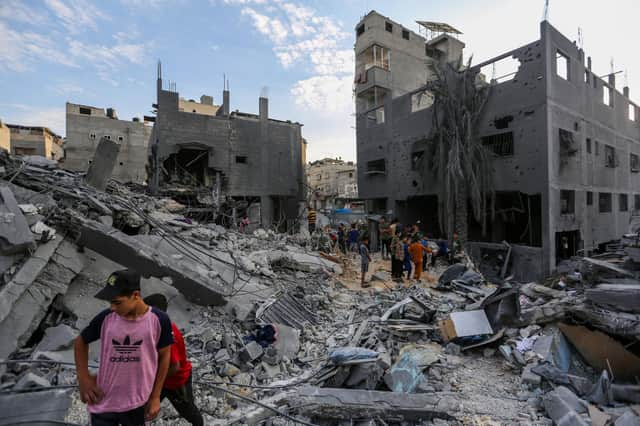Israel-Gaza: "Massive" air strikes to be launched by Israel as Hamas vows to use "full force"


Israel is expanding its ground operation in Gaza, with infantry and armoured vehicles backed by “massive” strikes from the air and sea, a military spokesman has said.
Rear Admiral Daniel Hagari said on Saturday that “the forces are still on the ground and are continuing the war”. Earlier on today, the military had released videos showing columns of armoured vehicles moving slowly in open sandy areas of Gaza, the first visual confirmation of ground troops. Previously, troops had conducted brief nightly ground incursions before returning to Israel.
Advertisement
Hide AdAdvertisement
Hide AdMeanwhile, Hamas leaders say they are "completely ready" to confront Israeli forces head-on.
Last night (27 October) explosions from continuous air strikes lit up the sky over Gaza City for hours after nightfall. The Palestinian telecom provider, Paltel, said the bombardment caused “complete disruption” of internet, mobile phone and landline services.
Already plunged into darkness after most electricity was cut off weeks ago, Palestinians were thrown into isolation, huddling in homes and shelters with food and water supplies running out. Relatives outside Gaza panicked after their messaging chats with families inside suddenly went dead and calls stopped going through.
“I was so scared this was going to happen,” said Wafaa Abdul Rahman, director of a feminist organisation based in the West Bank city of Ramallah. She said she had not heard for hours from family in central Gaza. “We’ve been seeing these horrible things and massacres when it’s live on TV, so now what will happen when there’s a total blackout?”
Advertisement
Hide AdAdvertisement
Hide AdThe Hamas media centre reported heavy night time clashes at several places, including what it said was an Israeli incursion east of Bureij. Asked about the report, the Israeli military reiterated early on Saturday that it had been carrying out targeted raids and expanding strikes with the aim of “preparing the ground for future stages of the operation”.
Lynn Hastings, UN humanitarian coordinator for the occupied territories, posted on X, formerly known as Twitter, that without phone lines and internet, hospitals and aid operations would be unable to operate. The Red Crescent said it could not contact its medical teams and residents could no longer call ambulances, meaning rescuers would have to chase the sound of explosions to find the wounded.
International aid groups said they were only able to reach a few staff using satellite phones. Israel said its strikes target Hamas fighters and infrastructure and that the militants operate from among civilians, putting them in danger.
Today, thousands of pro-Palestinian protesters are expected to take to the streets of Britain.
Advertisement
Hide AdAdvertisement
Hide AdPolice expect about 100,000 people to join a demonstration in London demanding a ceasefire in the Israel-Hamas war, with other rallies organised elsewhere in the UK – including in Manchester and Glasgow.
Prime Minister Rishi Sunak signalled that police are unlikely to be given more powers to address chants deemed to be extremist after the comments at last Saturday’s rally. That is despite suggestions from Sir Mark that laws may need to be redrawn following concerns about gaps in current anti-extremism legislation.
Comment Guidelines
National World encourages reader discussion on our stories. User feedback, insights and back-and-forth exchanges add a rich layer of context to reporting. Please review our Community Guidelines before commenting.
